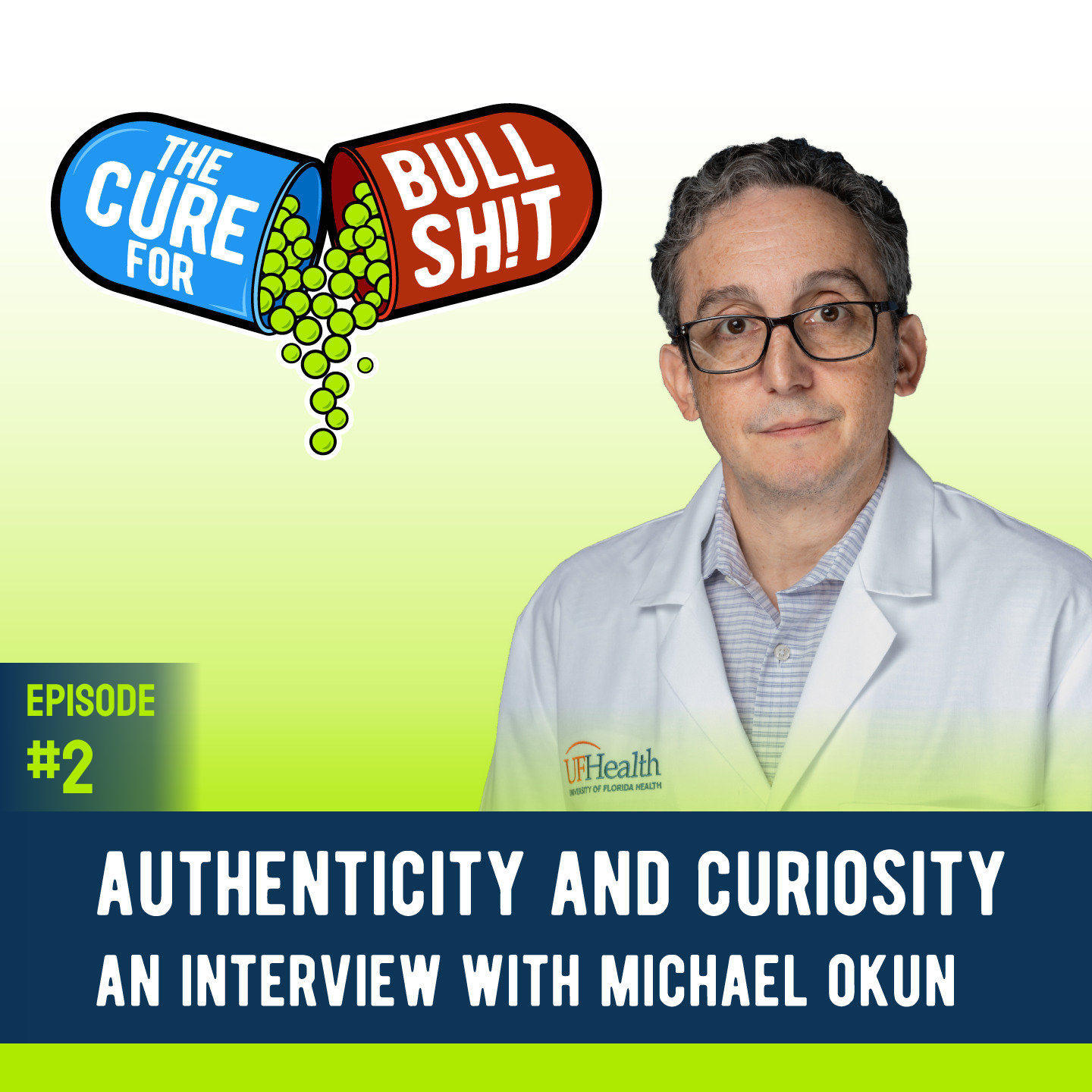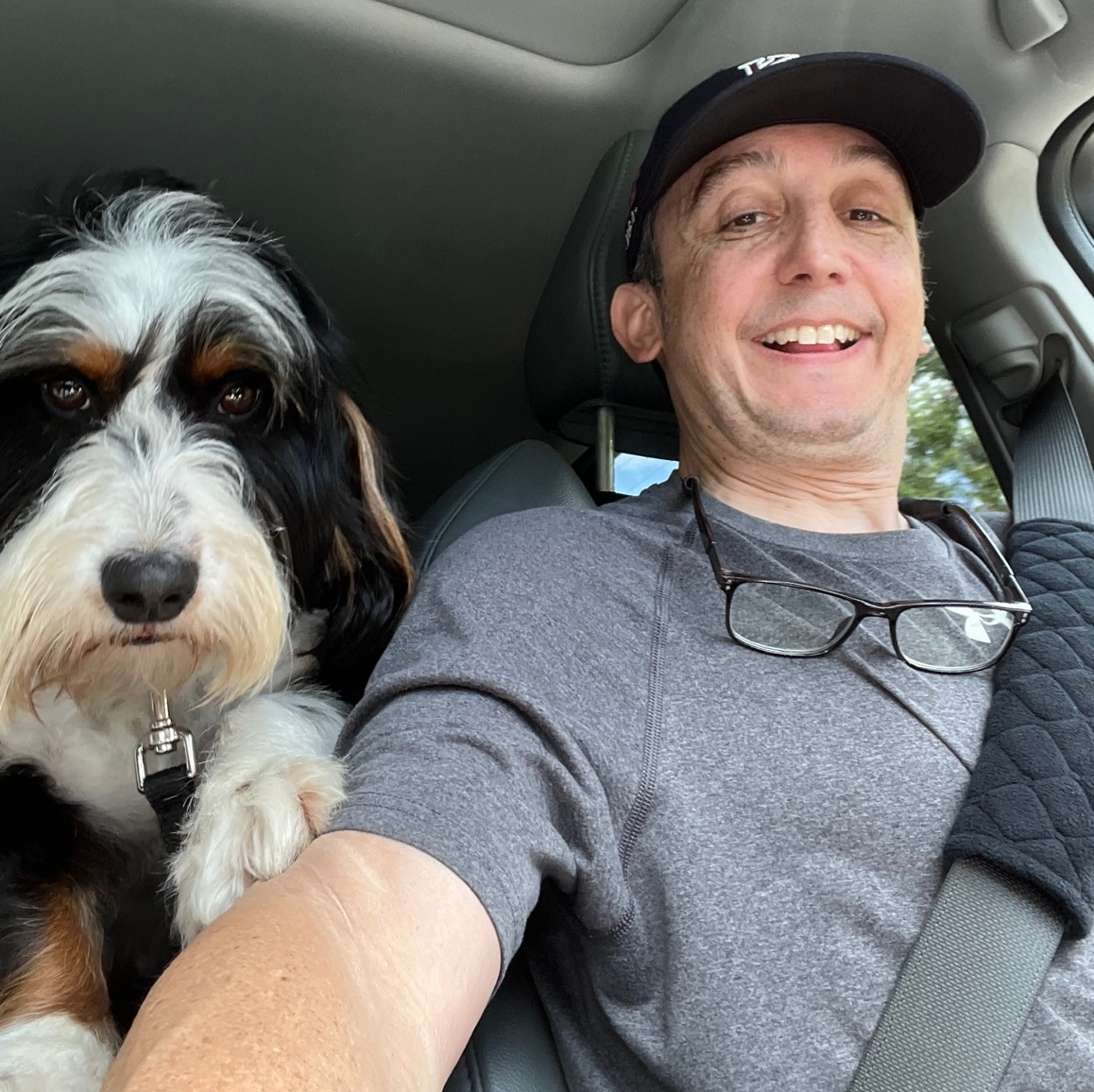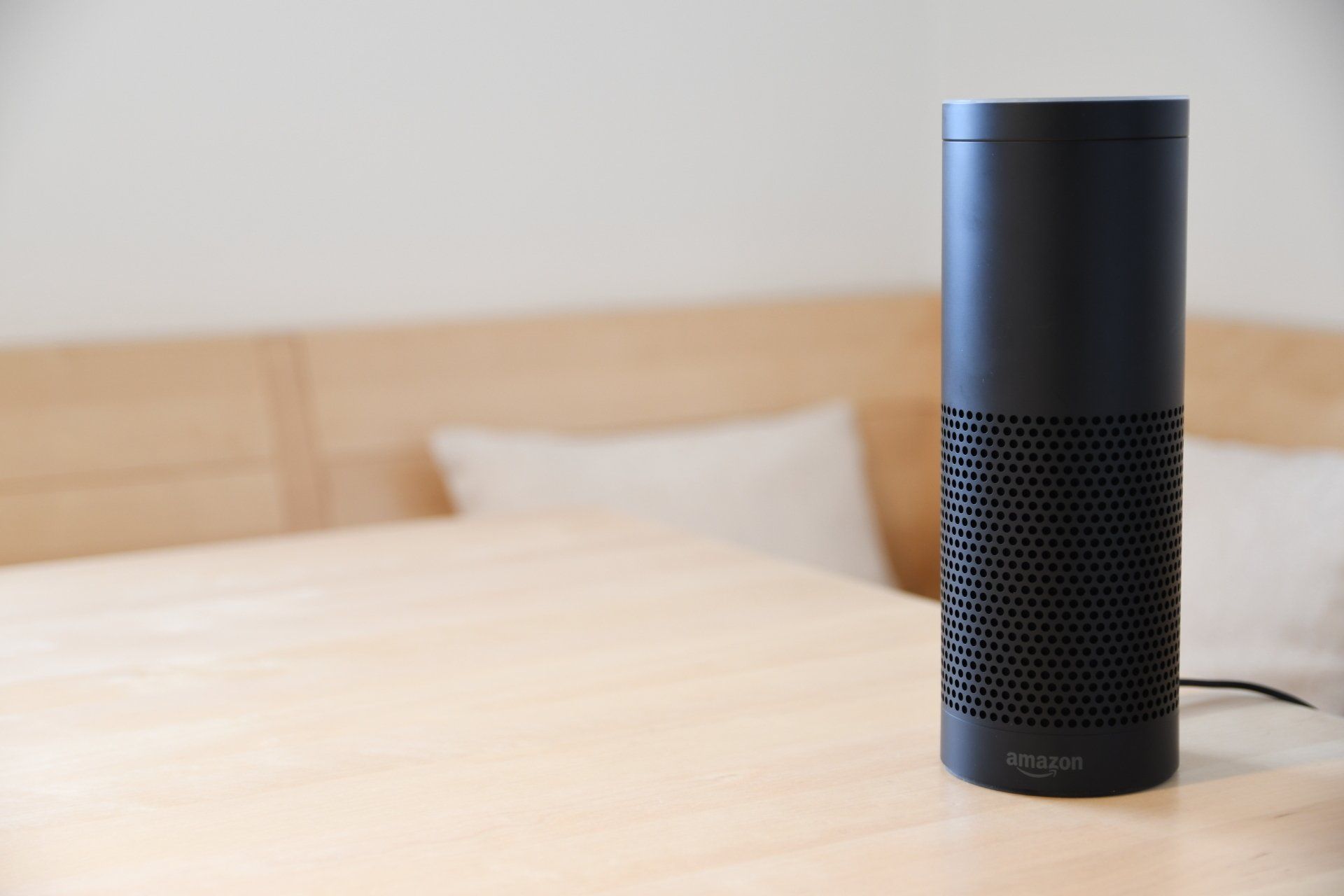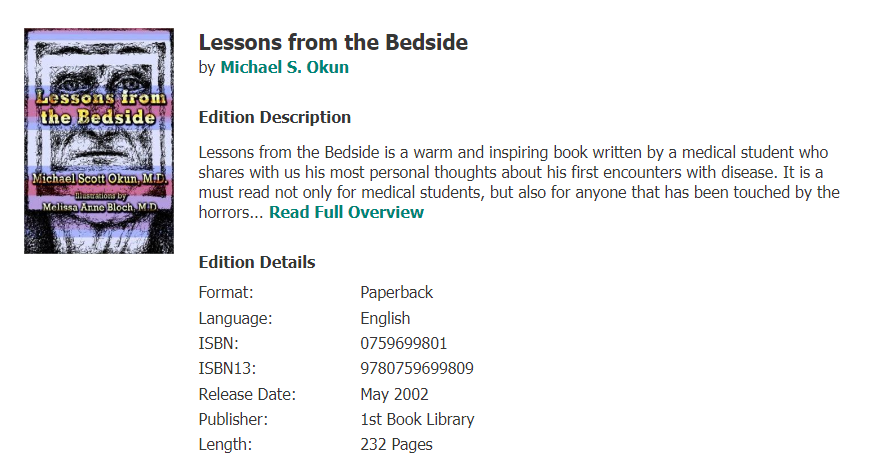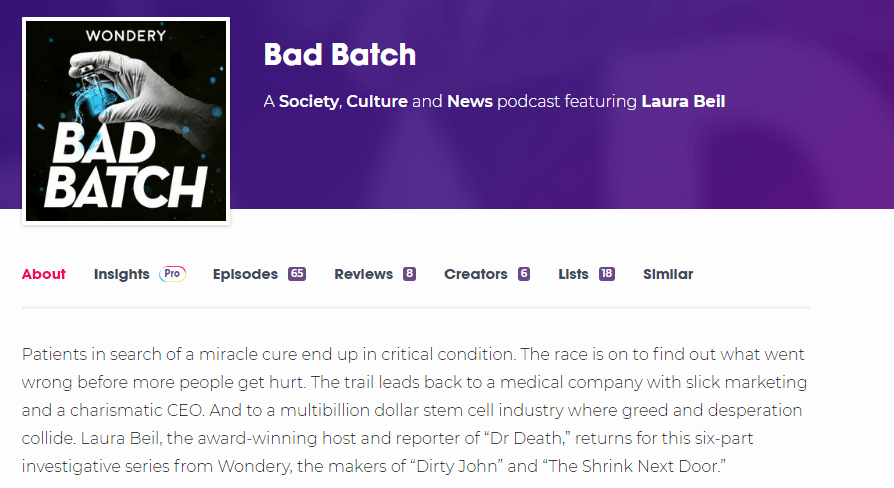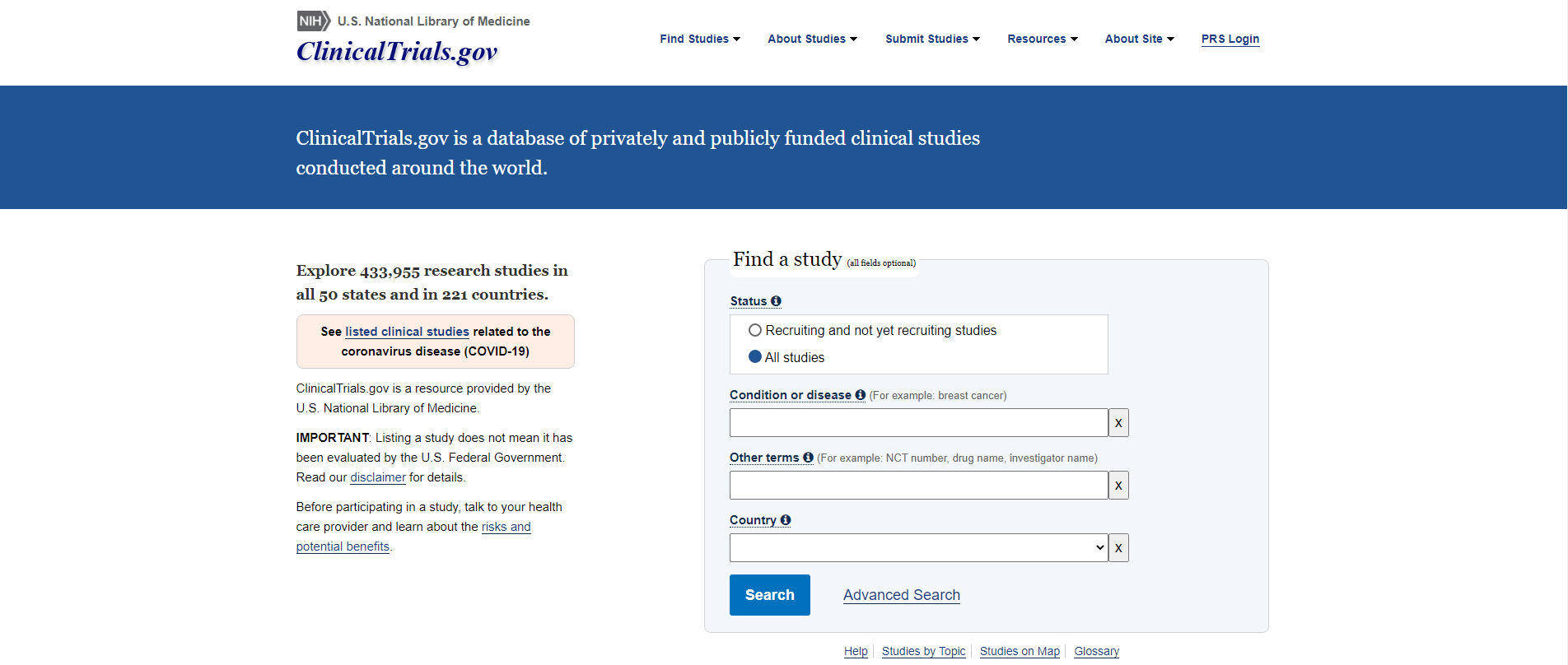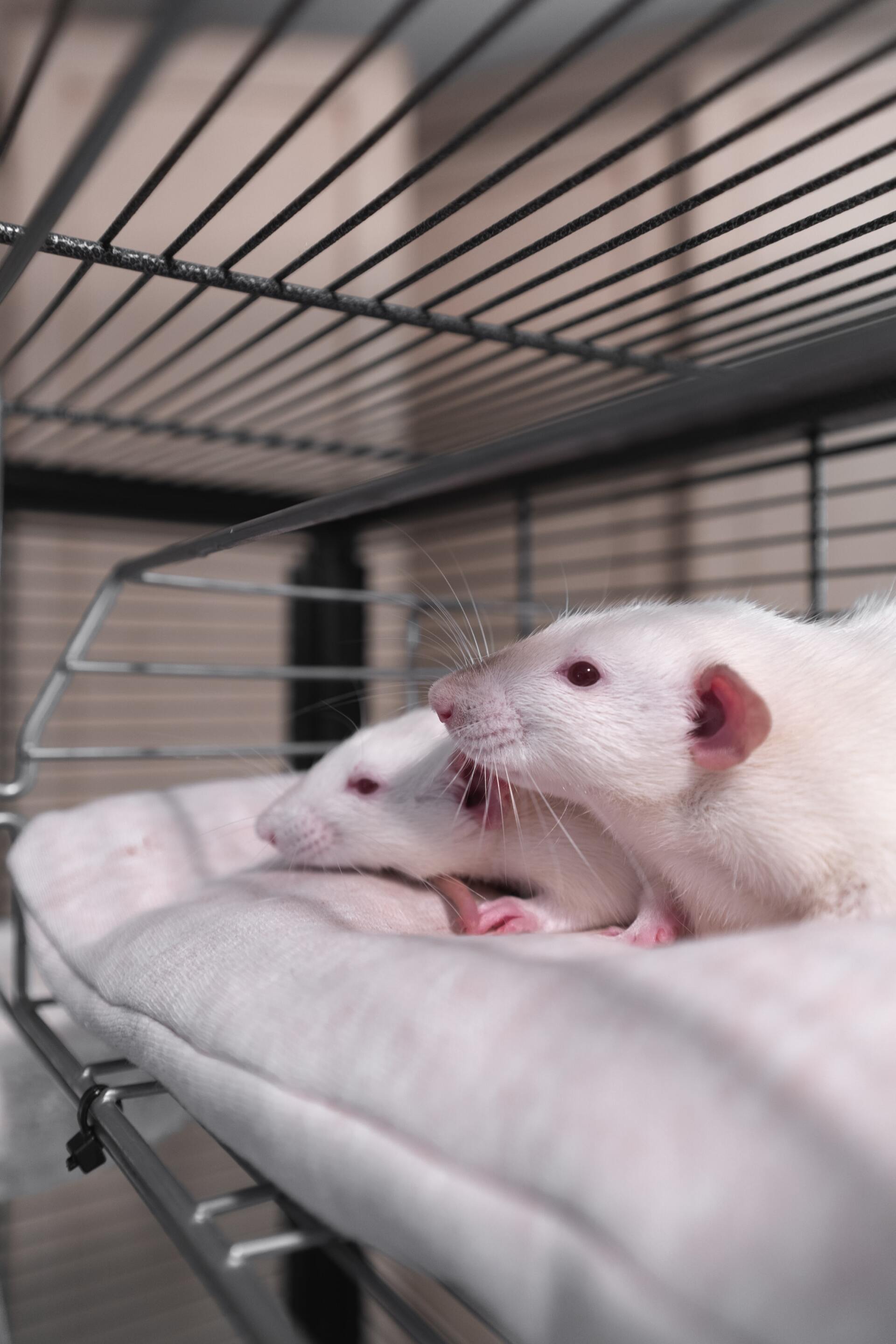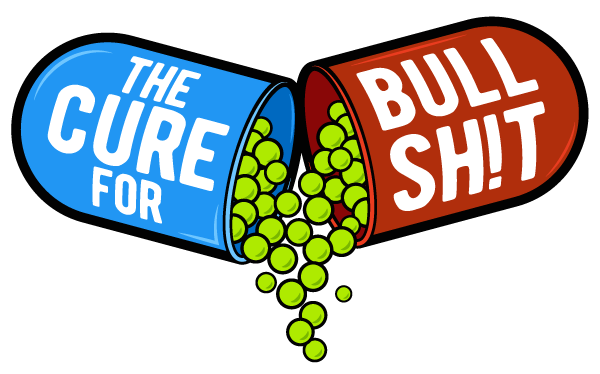0:06
Welcome to the cure for bullshit a podcast where we interview patients, doctors, researchers and skeptics about their practical advice for navigating the health care system, and steering clear of medical scams. These interviews will also be part of a forthcoming book that will serve as a master class for avoiding and dealing with medical bullshit. I'm your host Benzi Kluger neurologist, researcher and advocate for empowering people to play a greater role in directing their health and health care.
0:33
And I'm Janece Matsko, your co-host editor, and resident bullshit aficionado.
0:39
This is episode two, "authenticity and curiosity: the path to share truth". Today we're talking with Michael Okun. Physician, author and national medical adviser to the Parkinson's foundation about his approach to patient advocacy and how to talk to doctors. He also shares how he stays curious and authentic while answering the many questions he receives from patients in clinic. And also online as the author of The Parkinson Foundation asked the doctor the blog. All right, well, welcome to the show today. And it's really my pleasure and honor to welcome one of my friends, mentors, leading voices in the field of neurology, Michael Okun. Michael, thank you for being on the show. Can you tell us a little bit about yourself?
1:20
S ure. Well, it's a pleasure to be here on your podcast. I'm a Professor of Neurology at the University of Florida. I also studied history when I was an undergraduate, and I've been involved with a lot of interesting projects throughout my career. And, you know, it'll be a pleasure to talk about any and all, you know, topics that we think that your listeners might be interested in today,
1:48
why don't we start talking about bullshit, you know, hence the title of the podcast. And Michael, I think like me, you've seen a lot of bullshit in the world of Parkinson's, that was certainly my motivation for getting interested in bullshit is stem cells, there's glutathione, maybe you start by telling us a little bit about your role as medical director and ask the doctor and, you know, how do you how do you handle questions from people that you perceive as bullshit?
2:15
Yeah, so you know, when you're human, you are going to be exposed to a lot of different sides of every argument of every potential claim. And if you happen to have a medical disease, everybody's going to want to give you advice, and everybody's going to want to ask you for advice. And if you happen to have an MD or a DO, or, or any initials after your name that show that you are some sort of medical authority, then then you'll even get more of these. And so a number of years ago, I started to answer questions for the Parkinson's Foundation, as their medical director, it was somewhere around 2005 2006. And, and we get questions from every continent all around the world. But fundamentally, people could ask anything they wanted. And that's a great forum for exchange. But it turns out that people would get very angry sometimes if the answers didn't align with what they wanted to hear. And, you know, we tried to be as honest as we could, but people would ask us, you know, questions about things that didn't have data that were associated with them. And people still ask us, you know, today, and we run a 1-800-4PD-INFO helpline with I think the best nurses and most caring nurses and, you know, best trained nurses and we still get these outlandish questions. And sometimes they're more comments than questions, because I'm not really sure that there is always an interest to know what the data is and where the data is. And, and I say this with some humility, that every day I practice medicine, I know a little bit less. I mean, it is a very humbling profession, right. And so it's not like you ever want to go into a conversation and act like you know, everything because things change over time. But there's a reasonable amount of knowledge, or there's a lack of knowledge on some of these issues that folks ask about. And I do think that, especially when there's a safety concern that we really do need to share what we know even if it's what people don't want to hear,
4:31
To take a specific example that, you know, comes up a lot is stem cells. And I think a lot of people are very excited. That's, you know, and they've read on a website somewhere or they've gotten a book that stem cells are going to cure their Parkinson's disease. What's your approach to a person asking you your opinion about Parkinson's or potentially a patient of yours who's seeking your advice on whether to proceed with that procedure?
4:54
You know, I like to start with the idea and the notion that you know, There's nothing wrong with stem cells, a stem cell is just a thing. And try to make sure that the baseline of information that we're talking about is the same. So we're having sort of a fair conversation and, and understanding that you have cells in your body that are, you know, like your kids that are growing up, and some haven't decided what they're going to be when they grow up. And people call those progenitor cells or stem cells. And then if you can influence your kids, as you know, sometimes influencing your kids can be a hard thing. But that's kind of the notion of what's happening with the stem cell, right? You have scientists that maybe take a skin cell and try to turn it into a brain cell. It's pretty cool. And I think that it's reasonable for people to be drawn to this. And in some ways, it's miraculous. Maybe not a miracle, but miraculous, and, and so, you know, starting from a baseline of what is this therapy, and then taking people to the next step, which is okay, so you, you can turn a cell, let's say, into a dopamine cell, and most people know that Parkinson has a lot of dysfunction with dopamine, it's not exclusively dopamine disease, but but certainly dopamine plays a big role in this right. So okay, so now, we can make dopamine cells. That sounds pretty great, right? And what if we could put the dopamine cells into the brain that are dying, like replace those cells? Hey, that sounds pretty awesome, right. And so the issue is that as we do this, we now have a lot of data to show that it doesn't work so great to stick these cells into the brain. It certainly doesn't work to stick the cells into an IV and hope they get to the brain. And when you talk about wanting your kids to do something, it's not just turning them into something, let's say you could turn your kid into a doctor or a lawyer or an accountant, even if you could, you can't make them go everywhere they need to go and Parkinson is a disease that has a lot of circuits that are abnormal. And so getting those cells to go where you need them to go, it turns out is a much harder ask than I think scientists realize when they started. And that's just the reality of where things are. But every time you have a therapy, and maybe this gets at your question a little bit, it doesn't matter. You know what the disease is, there will always be one thing, one great hope that everybody puts their like money on. And it's almost human nature that they need to do that. Today, that great hope is going to be the stem cell, right? Although now after 20 years of all these people promising Oh, give me all your money, $5 million dollars, 5 million $10 million, were going to cure Parkinson, there will always be something in that pole position and that top position in people's minds, because people do need hope. But there's danger, you know, with these types of stem cell approaches. And what I've realized now is that there are 1000s of these operations that are in the United States alone, many more throughout the world. There's been some great investigative reporting on this by Laura Beil, whos e father had Parkinson disease and was considering a stem cell transplant. And she had a very nice podcast called Bad Batch. And she's also, you know, done some other ones, the vaping fix and Doctor death. And so she's a very skilled investigative journalist, and just looking at the issues, and that, that balance between the hope of the person, but what can this therapy actually deliver. And then there can be real consequences. And there can be deaths, there can be tumors, there can be, you know, all sorts of other things contaminants. And so it's not always the safest approach. And I've also seen people who are from the highest socio economic classes, who have the ability to go out and pay for these things, you know, out of pocket, and they say, Well, I'm just going to do it, because I've got the money. And even if it's the cost of the house, you know, it doesn't matter to me, if there's any chance, even if they're ripping me off, I'm going to take that chance. And I've seen people both do this, and it doesn't work. I've seen people do it and get side effects. And I've seen people do it and become so depressed afterward that they committed suicide. So you know, there are consequences. And so I think, in having the stem cell discussion, there's a difference between science and stem cells. And there's a difference between the actual, you know, delivery of a research instrument and so you might go on to clinicaltrials.gov, where almost all studies are registered these days. But it turns out that even some of those listings are not legitimate. Imagine that on a government website. It doesn't stop you from being an illegitimate peddler of therapies, of snake oil of whatever it is, it doesn't stop you from doing that. So do people get confused. So I always tell people, whether you're talking about stem cells or another therapy, it's still experimental, it's still research, you should never pay for research, you should always ask for the Institutional Review Board protocol and consent and copy of it, and bring it to an outside medical professional that you trust to look at those documents. And most people are not doctors or scientists, you got to bring it to somebody that can look at it and say, Okay, this is a legitimate body that's overseeing this it's called an Institutional Review Board. This is a legitimate study. And these are the risks and benefits, and you need a third party to kind of explain it to you, when there's that much at stake, you should never pay for it and the Parkinson Foundation, we put out a nice, you know, statement on this, and it has some nice tips for folks,
10:48
we'll definitely put all of those resources in our show notes for the episode. I love that idea that you kind of started with this, like going back to the basics and that baseline information. And it reminds me of I don't know if you're familiar with Brene Brown, but one of the things that she always talks about is clear is kind and unclear is unkind, right. So I just feel like sometimes people don't get enough of that basic understanding, you know, they kind of make certain assumptions about how certain things work. And when they're doing this, this research on their own or collecting information. They're a little overconfident. And that can go both ways, you know, a medical professional could also have an over estimation of their knowledge of how those mechanisms are actually working, if that's not necessarily their specialty, or if they have outdated information.
11:43
Yeah, and I think one of the things that we've learned recently, you know, with vaccines and the pandemic, and several psychologists have written about this Adam Grant has written about this notion of how we approach people, right. And, and we're learning right, and, you know, I think I said earlier, and I'll say it again, every day, I know less in practicing medicine. And, you know, I learned through the school of hard knocks and talking to people about vaccines and, and risks and benefits, that the most important thing to do I wasn't doing which is approach the person from the point of view that their opinion matters. And you're not going to tell them what to do or what to think, or you want to hear their opinion, and you've got information to share. And if you'd like to hear it, happy to share it, but that no matter what you decide, I respect you. And starting with that level of respect, you have the best chance of being able to climb over the hill and get to the goal. But have the person feel comfortable that they're hearing you and you're gonna respect them at the end of it, no matter what they decide. And it's hard, like as a human to do
13:00
That actually hits really close to home. My mom is adamant about not getting the vaccine at this point. And I feel like I have tried everything under the sun to connect and, and that kind of thing. So yeah, that conversation just hits home for me.
13:16
It's tough. I mean, because I think the idea is that the internet is this great equalizer. And now I have the same access to information that you do. And maybe there are no experts or I can choose whatever experts I want. I don't know. So do you have any advice for people who are wanting to do their own research who may be you know, which is not uncommon, they don't trust their doctor. They don't trust certain aspects of the medical establishment or, you know, what have you. So how can people who are wanting to go it alone do it, or is that just a foolhardy endeavor?
13:51
Yeah, no, I don't think it's foolhardy at all. And I think in some ways we have defeated ourselves in medicine, because over time, you know, the economics have driven the doctor patient relationship to be shorter, less meaningful. And, you know, there's not a lot of time for chit chat. And, you know, when people come to us, and they say, I was reading about this on the internet, a lot of the physicians will say things like, don't read anything on the internet, don't read a book, you want to know it, you tell... you come to me. But at the same time, they've only got three minutes to spend with you, right? And it doesn't end up being a meaningful relationship. Whereas what we should be doing in the idealized world is saying to people, the best thing you can do is go get all the information. Go get all of it, get it from the different TV networks, get it from liberals, get it from conservatives, get it from independents get it from communists. Get it from, you know, from from people of different religions get as much information as you can, and analyze the information and have conversations with people about it. And there's an old fashioned saying, you know about meaning and conversations in terms of "reaching grandma's attic". I don't know if you've heard this before. But grandma's attic is like when you are moving, and you have one of those like U haul moving vans, the front of the moving van is you know where you sit, but there's a little space that comes over the top of that, that you can actually put books or things, and you tend to put your most valuable things on top of that. And then as you're loading the truck, you're more valuable things are going on the inside. And then when you're trying to close that door at the end, you're kicking the lawn chairs, and and whatever you can do to close that door. But when you're asking questions, it takes time to get to know people it takes time to get that relationship it gets takes time to reach the meaning. And we call that reaching grandma's attic. And so in medicine, we often don't take the time to open the U haul and keep asking the questions. You know, you got to ask 3-4-5-6-8 questions, and then you start to unload and then you finally get to that meaningful point. And I think that, you know, with the haste of society, with the changes in health care, with just people being in a rush all the time, we actually don't get to Grandma's attic. And so we give up at question three or question four, we're not really willing to have the conversation, we just want to, you know, look at the other person and say, I can't believe that how can I be friends with them? You know, I can't believe they would think that instead of really trying to get to Grandma's attic and understand why the person thinks the way that they do and have them understand why you think the way that you do and that takes time.
16:58
Right? Yeah, you just want to get your points and you want to convince them you want to say that one right thing that's gonna just magically transport you to Grandma's attic. That's not really how how that happens.
17:11
You bring up some great points. You know, one is starting with shared facts, I think it's very clear from your approach, that you're treating people with serious illness respectfully, you know, as adults who are able to think and reason and that's not universal. One thing that I think is an appeal, you know, sometimes in the complementary and alternative medicine world and others is that they do a better job of empathy and working with hope. And wondering, how can we do a more skillful job of maintaining and holding on to hope because I feel like the emotional piece and that empathy and that relationship, you know, can be a place where we lose people?
17:52
Yeah, I mean, I think it's, it's really important, right? And people that know me know that I'm more of a glass half full kind of person. And so I think one of my challenges, is, I'm trying to become a little bit better at sharing my own philosophy with people. So they don't have to have a crystal ball and say, Well, what does Michael Okun actually believe? Or what's his core value, right. And I think that part of the keys to a better understanding of how to represent hope, when you're talking not only with persons with disease, but persons around them, family members, friends, and maintaining a level of credibility is, you know, being willing to share yourself, like what your core values are, and how you kind of see the world and what balance you see. And I do think that it's wrong to just go after that hopeful, everything's gonna be great, you know, you have Parkinson disease, everything's gonna be great, you have cancer, everything's gonna be great. And I think part of what you're getting at is, you know, how important it is, for us to be patient and to have balance, you know, in our approach, and, and that these are complex issues, you know, and that if we don't take the time to really get to know people, you know, it's hard to get to the higher level discussion. It's hard to get credibility. And so if you don't know me, you know, what I believe in and know my core values. How could you feel hopeful about your medical experience?
19:32
Is it possible? Do you think for people who are not not doctors to bring that out in the health care professionals that they're seeing? Yeah, I
19:42
think there's a number of different ways to do that. And I think everybody needs to find their own style and their own approach, but practitioners seem to be really allergic to asking people, What do you want? What's the outcome that you would like. And you know, and when people share something, you know, or if they share something negative, you know, we seem to be allergic to saying to people, you know what, I think that sucks. I'm really sorry, you know, like about that, and being honest, can be much more validating. And I think it's important also, to just say, hey, you know what? I'm wrong, you know, or tell them, you know, like, I used to do this, and it didn't seem to go well. So I stopped doing that. But, you know, I'm not, I'm not Einstein on everything. And then a lot of medicine is trial and error. And I know you think that we have it all in a secret Harry Potter spell book, you know that we know exactly what to do. When we see what situation we encounter, we just cast the right spell. But it didn't used to be that way. And in fact, if you look historically, at physicians, and you start to look back a couple of 100 years, a lot of what physicians did actually didn't make people live longer or do better, you know, right. And it really was the last 100 years where we really started to see in the last 100 150 200 years, where you start to see the medical advances and getting away from bleeding people and giving them arsenic. And we then ask ourselves, do we judge our society and 10 years, okay, now, you can trust us, even though 50 years ago, we were not as trustable. Now, you can trust us. Or are we a society that's in a little bit too much of a rush to say, Okay, you should accept everything that I say because I am the Doctor. But you know, if they do a little bit of reading, they realize the doctors weren't exactly the most trustable, 150 years ago, because at the end of the day, you know, you have to trust them, and they have to trust you. I often say to people, in fact, I say to every one of the people that I see, I say to them, I'm like your cabinet advisor, I've seen a whole bunch of stuff. And I'll give you the best advice I can. But I will not tell you, you have to do anything. And all I ask from you is just tell me what you did. Because a lot of times you'll do something different. And I'll learn from it, especially in Parkinson, I'll be like, Oh, my gosh, you tried that that worked. I should think about that. Maybe that maybe that's a better way to do it. And I think taking that much less paternalistic perspective, has been helpful. Its certainly made my interactions as a physician more meaningful with people with disease and with families, but also more authentic.
22:42
Yeah. And to your point about the history of medicine, there are people that absolutely believe that these new mRNA vaccines will be one of those things that we look back on 50 100 years from now, in a similar way as we look back at practices like bloodletting, and maybe that will happen, and maybe it won't. But based on what we know, right now, it's frustrating to see people or someone, you have a close relationship with someone you love, making decisions about vaccination or masking, I don't see getting a vaccine as the same kind of personal medical decision as a stem cell treatment. Right, getting a vaccine helps protect not just yourself, but those around you. I also don't want an argument over getting vaccinated or not to impact the relationship with the people that I'm trying to protect by making that decision for myself.
23:46
Yeah. And I just don't think that it's fair to judge people on, you know, their intelligence or their integrity on one issue, because they go a different side of the issue. Absolutely. This pandemic has touched everybody, you know, in some way. And it's hard sometimes to try not to be partisan and try to hear the other side, because we're talking about the pandemic now. But we could be talking about cancer, we could be talking about Parkinson, we could be talking about any of these things. That core principle is something that should guide us it's some silver lining of what we're learning during this pandemic of how we're, you know, going back and forth with people that are coming in and asking for help. Because when you go to see a health care practitioner, you're essentially asking for help. Right? And people forget that right? Because it's like, oh, it's just you know, Dr. Kluger has appointments and they're gonna go, you know, every 10 minutes or whatever. And so it's just one after the other for him. Or for each one of those people. They're there because they need help. They're asking you for help. They don't say, you know, Dr. Kluger, I need help but really, yeah, that's what they're there for. They want to be helped, you know, And we have to respond in the more appropriate way. And as the world's gotten busier, I think we respond in a in a convenient way, and not in an appropriate way. Always. I feel badly, you know, in the weeks that I look back where I'm trying to get through my days, because there's so many people and, you know, to see, and there's so many important conversations to have, and I feel super bad. So it's hard right now, I think there's a lot of pressure on healthcare providers on the other side. And so when you talk about cutting through the crap, and, you know, getting to the truth and everything, there's a lot of pressure that people have to get the get the right amount of time to be able to, to have that conversation in the right way.
24:06
Right? How can I help is such a powerful question, you know, like, I just think like, no matter what industry you're in, or how you're interacting with people, it's just like, it's such a powerful question.
25:52
Absolutely.
25:53
Can I ask you, Janece, and then flip things around, you know, both to me and Michael, and so Michaels advice, I think is awesome and perfect for the healthcare provider. But there's different types of people living with illness. You know, some people want to be a, you know, good patient, doctors can be intimidating. So I was gonna ask, you know, your Janece, I mean, if you're seeing Michael, or if you're seeing me, or you're seeing somebody, you know, who has a humanistic approach and is person centered, then you know, it makes your job easier, but I'm assuming for you, and I know, for me when I've been in the patient seat, it's not always not always the case. Would you agree with that?
26:32
Yeah. And unfortunately, in the system that we're in, sometimes just getting in the seat is hard enough, you know, making that decision to make the call and ask for help, like you were saying, or even making the decision, can I financially afford this right now? Is it bad enough for me even to go in and sit down in that seat and start this process? But even if I ....which, I don't I don't have an existing relationship with any kind of regular physician, I don't go in for a yearly like checkups, like I probably should, like most of us probably should, because of of the way that our healthcare system works currently. But if I were to have an existing relationship with somebody, yeah, that beginning conversation and meeting somebody as a human and saying, like, what are your core values? This is how I prefer to go about, you know, my recommendations, is also, I think, really valuable for the individual to assess, like, is this the right person for me to be going through this process with?
27:38
You know, I don't know. I mean, sometimes you can get a second opinion. Sometimes it feels like you're really trapped, and you're in the hospital, you have doctors who aren't listening to you. And you know, what do you do at that point, I mean, if you're my relative, you might call me and I might give them a call. But if you're not related to a doctor, I don't know Michael if you have ideas or thoughts or Janece, if you've been in that situation and found some ways out of it, I want to make sure we're kind of looking at both sides. So how to be a better doctor. But can you be a better patient? And can you be a better patient in a way that makes your doctor a better doctor?
28:07
Well, I think the answer is definitely yes. I think we do a poor job of teaching people how to play their role. We often do this, you know, with our students, like we say, you know, you're a terrible mentee. Right? Like you don't do anything. Well, you never tell them like, okay, a good mentee asks these kinds of questions comes prepared doing these things. And when we actually tell them that they become good mentees and good students, and they succeed, but we never really make a concerted effort to tell people, you know, like, how could you be a good person with disease to the doctor, a good patient, if you use that term, there are some efforts in Parkinson disease with the foundations and they have said, Here's, you know, a list of 10 things that you should be ready with to ask your doctor about. And I think that's the organization's the, the foundation organizations, and perhaps because they're so driven by the persons with disease and the families that they actually are crying out for, you know, like, we need more like, you need to tell us, should I bring a list of my medicine, you know, like, what should I do? And in what order, and also just telling people look, you don't have to do it all on a day. I mean, it's tough. Like it's, it can be really tough, depending on what system that you live in. We don't make it any easier for them. And then oh, by the way, they have a disease that affects their mobility, right? And so it's hard for them to get around and get the car and then we'll yell at them when they're late to our appointments and, and I've heard old fashioned Doc's get way over the top with paternalistic like you have to sit here and you have to dress this way. You have to do that. And okay, that's probably an extreme version of what we're talking about now, but in some ways, maybe they have it right. It's kind of like when the Jewish mothers have it right about something, you know that they think like your kid, our kid should play football because concussions might hurt them? Well, the Jewish mothers turned out to be right. Maybe the old fashioned paternalistic doctors are right in that one sense that, you know, the ones that tell them you've got to ungown, you've got to sit this way, you got to do this thing, you've got to write your questions down, you got it, you know, like, they come and they know what to do, you know, they can play a part. Whereas now we've become so laissez faire, that, you know, it's like, yeah, why are you here? Do you know, like, what's, what's going on, and everybody's looking at each other, and nobody knows what to do. And so their roles are a little bit off. And so maybe getting back to your question Benzi, maybe it's maybe we don't do enough about establishing the roles. And, you know, and talking that through with people,
30:55
This conversation reminds me a lot of, you know, my experience in business development and marketing and that kind of thing. And just working with businesses and their, their employee cultures, and how the rules that you're talking about, or the roles that you're talking about, kind of get established in one of two ways. And those, those are boundaries, right? Whether they're written rules, or, you know, interpersonal boundary making, as far as saying like, this is okay, and this is not okay. And I think if I went to a doctor's website, and there was a list of, here's what's okay asked me lots of questions, you know, like come with a list of questions come with a list of symptoms, just making that very clear that you're not going to say no to lots of questions, or you're not going to say no to going a little bit over your appointment time, or that kind of thing. And then also, just culturally, I think we've gotten away from putting, like values and expectations, and that kind of thing out there into the world as far as like what our cultural expectations are. And if you don't set cultural expectations, then they set themselves. One way or another, you're going to have a culture, and it's either the culture that you want, or is the culture that you don't want. So, you know, if you don't set those for your space as a health care provider, then the culture around you will set them, people will make assumptions like, oh, I can't afford to go there, or they're not going to respect me, those types of assumptions are going to be made unless they're really explicitly stated, I feel like,
32:29
I think you make a really powerful point Janece, that the culture is what we make it right, you know, we dictate that and maybe getting back to Benzi's point, we should think about that more. We're not being deliberate anymore. In medicine, I can't imagine that we're unique in some ways, but when it turns into a very hustle bustle, trying to get through, and everybody's coming in and out, and that becomes more fast food. In its atmosphere, we stop being deliberate, you know, and when we stop being deliberate, then why are we surprised that the culture or the interaction, or you know, our ability to reach people, or our ability to reach the peak of our potential? So I do think that causes me to be a little more reflective that, you know, we should probably be deliberate in the type of culture the type of rules that we'd like to say,
33:27
Well, because I can tell you, you know, these wellness influencers that are on Instagram and social media and online and YouTube, and they are very intentional about the expectations and the culture that they're setting and they know who they're talking to, they know who they're bringing in, even if their intentions are. What's the word I'm looking fo r? benevolent..
33:51
Nefarious?
33:52
No, even if even if their intentions are benevolent. Right? Okay. You know, they, they, they know who is going to listen to them, even if they have nefarious impacts, right, or unintended impacts and consequences. They're being very intentional. And I think that is also part of why mainstream medicine or modern medicine or whatever you want to call it is kind of losing its influence and its level of trust is because it's, it feels like there's just no competition, right? It's like, oh, here's this person that really, really obviously cares about me. They're telling me over and over and over how much they care about me and are listening to me. And then there's this faceless, emotionless institution that is telling me just one word answers and this is truth. And this is not truth. And that's not appealing,right?
34:43
Yeah, yeah. And I, I agree with you. And I think it gets back to maybe the thesis of where this is all going, which is authenticity. So when we see these personalities, we ask ourselves, are they authentic? And it doesn't mean that we all have to be the same. I mean, obviously Benzi and I are both neurologists trained in a very similar way. We've had some of the same mentors on our pedigree, I'm a little bit older than him. But I think for us to connect and reach hope and reach a higher level of interaction and trust with our persons with disease and patients and family members, we have to be authentic. One of the things I know about Benzi is he's very authentic, nobody meets Benzi Kluger, and doesn't say this guy, he's completely authentic. And I think that authenticity gives him a leg up in his journey to help people, right, people have an innate sense of whether you're authentic or not. And you know, there's not really a word for it, maybe that gets into poetry when we kind of can't find the words and we have to think more in emotional terms. But, you know, people can tell when you're being authentic, for the most part, and I think that when you talk about the cure for cutting through the crap, you're you're also talking about how important authenticity is, and, you know, relationships.
36:14
I kinda want to peel back the curtains on a few things. In medical school, there's kind of a written curriculum, and then there's an unwritten curriculum, your book, "Lessons from the Bedside", you know, it's authentic, you're vu lnerable. You know, it's not what people expect from a doctor. And so, you know, I wonder if you could speak of, you know, what did you learn? And maybe, you know, thinking about the unwritten curriculum? Are there things that med school does that may threaten people's authenticity, or their, you know, temptations to not be as vulnerable, as you as you're going on this road to becoming a doctor,
36:48
I will say that, you know, my own journey and going from history to medicine, it was culture shock, to say the least, my brain was thinking more about why do you take the hill? Or why is this topography important? Or why did a person make this decision, you know, and then moving into an environment where people were just trying to memorize as much raw knowledge as possible. And I'm not saying it's a bad thing. I mean, you obviously you want your physicians to be smart, but the humanity of the individuals, I think, going through the journey takes a real hit. It was really, it wasn't only eye opening, but I think it was a little bit disturbing. And, and I think precipitated, you know, feelings of depression, for sure. about like, what my life was like before or what my life is like, now, you know, there was this opportunity to go to the bedside. And we started a program called Kaleidoscope that then became the student arts and medicine program. And I just happen to be at a place where Jo hn Graham-Pole was at, and he was an oncologist that work with a nurse named Mary Rockwood Lane. And they were really into this idea of bringing art to the bedside. And, and it was not thought of positively by the hospital. And we were not welcome guests, we would get in trouble all the time, as students for doing this, you know, John Graham-Pole would hang with people like Patch Adams, and that kind of that kind of crowd. And we get into some trouble for doing this. But I got to sit with people, you know, who had diseases, share poetry, write about them, learn about them, have experiences from the other side, you know, trying to understand what it was like for them. And it's bi directional, as I've now learned, and, you know, reflecting about my experiences as a physician, you know, it's always bi directionally. I get as much out of that as the people that are with me. And if not more,
39:00
You just casually dropped the name Patch Adams there in the middle of that. I just want to say, I don't know that I necessarily, or that our listeners will necessarily realize that he was an actual person.
39:11
That's right.
39:12
And did you get a chance to meet Patch Adams or you knew someone who worked with him?
39:17
so I didn't need patch atoms, but there there was a group of people. So like, when your listeners are thinking about, like, there are rock stars, right. And so you know, it's the same in the humanities. Right. And so there was John Graham pole, and then there was Patch Adams, and there was a guy named John Fox who was, you know, big into poetry and medicine. There were like these, maybe not as well known as the rock stars, but these were the personalities, you know, that were, like hanging around and they were going around the hospitals and they were doing things where people were like, Oh, you're you're just silly clowns, you know, and this isn't real and people are really hurting and you shouldn't be going to the bedside and taking advantage of people. This isn't what they you know, want. And you know, there was this two sides of a huge thing where you had the bureaucracy of hospital systems and training systems saying, "No way, this isn't how we do things". And you have these, this group of people that are more hippy like that are saying, No, you know, these people are really hurting, we should get in here and show them some humanity. I just was around in the crowd of these types of people who were not so popular. They weren't, like famous. But now we look back and we say, these were the pioneers, these were the people that that changed how we thought of the bedside experience. I mean, we went through amazing amounts of pushback to get to the bedside to do poetry. I mean, I remember one time I got called into the office of the vice president, and I was in like, trouble for doing something like you're not allowed to do that you're not registered, and you shouldn't, you know, like, you're you're bringing in I was like, the leader of the students. So like, I was like, oh, man, am I gonna get expelled? Or like, how bad is this? And the best part was this particular person, I won't tell you who it was said to me, yeah, you're in a lot of trouble, but was smiling the whole time. And, you know, and just said, you know, you really shouldn't do that you shouldn't be doing like art stuff for our patients at the bedside. That's, that's really bad. And you should be in a lot of trouble. And then he was like, so just keep doing what you're doing and try to stay out of my office. And I actually got a message from that person last week, congratulating us on something in our institute. And I said to him, I said, Well, imagine if you had said something to me different, you know, during that conversation, would my life have turned out differently, so I really appreciate you and what you did, or what you didn't do, you know, in some, you know, a strange way. But to get back to Benzi's point, medicine was supposed to be so exact, but it was trying to be so exact, it seemed to be to not be that precise. And I think that's what pushed me to poetry, which was a vehicle that had the ability to say something and could capture the emotion didn't tell people what necessarily to think. But it didn't suffer from the imprecision of just regular speech. It wasn't clumsy, and I was moved, I had not seen people die before I had not seen people with, you know, like leukemias and cancers and split open by semi trucks. And I mean, I was moved to see that, and I couldn't have told you when I started medical school, probably with any level of competence, the difference between a neurologist and a neurosurgeon, I certainly had no desire to be a researcher, which people laugh at me now, you know, because they see, you know, the things that that we've published over the years, but you know, you just never know what your journey is going to bring. But to me poetry and lessons from the bedside was an important part of my journey. And a lot of that book was written on napkins and note cards. But that was, I think, a really important part of my own life for just appreciating the humanities and seeing the humanity in medicine, and in the people
43:18
seem paradoxical. But maybe it's not, you can tie this together. But I mean, right now, and what you're most known for is Deep Brain Stimulation surgery. And so you're very much into neurophysiology and science and, you know, biology. And you know, how do the lessons from the bedside tie into this mad scientist who's now standing above somebody's head and placing wires in the right part of the brain? How do those two things fit together?
43:45
So? It's a really great question. I'm glad you asked. I haven't been called a mad scientist yet. But it is something that I certainly fear, you know, becoming. Way back when I first started on the journey and had first started as a faculty member, I was actually interviewed by PBS in one of their specials. And they were talking about the language of the brain, and arts and the brain. And it was like, super controversial 20 years ago, for anybody to say, when you get exposed to a social context, to fear, to anger, to happiness, that this can affect your health. And I say that now when people say or they laugh well of course it does you know, like stress and anxiety, all these things, of course, they're major components, but 20 years ago, and this was another one of these like, super controversial things. And so entering into the field of actually recording out of the brain and then doing that interview with PBS. To me, it always made sense that the pathways were going to be linked to emotions and emotions were going to be linked to disease and and could influence the immune system and you know, like, my own journey is you know, a journey of being drawn to the conversations that are going on in the brain, just like I'm drawn to the conversations of, of how people communicate, and, and understanding how these networks connect. So I like to justify my mad scientist career now, as being completely consistent with my background and humanities, although I can see how the casual observer would not connect those two dots
45:30
In medicine, you know, one of the things that's, you know, again, not part of the formal curriculum is seeing the fragility of people, you know, surgery is just kind of a trippy thing. I mean, the first time you see somebody cut open, you're really confronted with your material existence in a way that, you know, most people don't think about, or try not to think about all that much. And I don't know if that's part of, you know, for you with co nnecting VBS and poetry, you know, that you're entering this realm that, you know, is, you know, hard to explain in words, as he says, you know, it's kind of imprecise, and you know, no amount of science is going to capture it. And you know, and probably in some way, no amount of poetry is going to capture it either.
46:10
You know, it's one of those things where there's so much value in reflection. And reflection, involves the past, the present and the future, right, and involves all all three, right, and that's what's so great about it. And I think it's really important to be be reflective, to reach that authenticity and to progress to grow. Right. And I, I'm personally one of those people that believes that we should grow every day. And so when people see you, you, you, hopefully are a better form of yourself than you were yesterday.
46:45
So Michael, yeah, to circle back around to things we were talking about the beginning. And whether we're talking about stem cells, whether we're talking about vaccines, that there's been a lot of dangerous misinformation disinformation. Do you have a prescription for the the cure for bullshit? Or what do you see is like the key ingredients, to try to help people to avoid falling victims to things that are dangerous, expensive, and may not be in their best interest?
47:13
Thanks for the question. And I knew coming on this podcast that this was probably going to end this way. You know, I'll just start by saying that I, philosophically, am not a big fan of the word cure. I think that, in some sense, there may not be a cure for anything. And back to the notion of hope, we hope that there's a cure, right, that there's the perfect answer. And as we seek it, it reminds me of the comedy in Monty Python and the Holy Grail, you know, we seek this Holy Grail, and everybody's laughing. You know, when that guy comes to the castle, he says, you have one of those holy grails he's like, that he's looks at the other guys in the castle and says yeah, I got one of those, they're all laughing,
48:03
We already got one.
48:03
Yeah, we've got one, right. And I'm, I'm sort of philosophically opposed to the idea that there's a cure for anything, even even for bullshit. However, that doesn't mean that we don't need to, to address this. I mean, we definitely need to address this problem. And you know, and since 2005 2006, with the Parkinson's foundation, you wouldn't believe the number of claims of things. And a lot of the claims are tied to to people making money. Sometimes they're not making money, sometimes it's, it's more about power, influence or other things, but I think that we do have a duty to protect. And so sometimes when people are disagreeing about about things, we have to agree on what we would like the outcome to be. And I think we all could come together and agree that we would like the outcome to be that people are protected, and that we are giving them accurate information, balanced information so that they can make their own decisions. And it's okay with me if people make some mistakes along the road, or they do things that are perfect, but they have to feel like they're going to be embraced by the medical establishment and not laughed at. We're as much at fault on the other side when people you know, go down these rabbit holes and things for not continuing to support them. I think our job is one of support. And I think that we have to help people and people come to us, you know, for that help. So my cure would be to get rid of the word cure, and to and to and to reframe it in a different philosophical context of, coming up with the common outcome of where we would like to get but not punishing people for taking the road less traveled.
50:10
I appreciate that.
50:11
The title certainly has a certain amount of tongue in cheek meaning to it in a way, you know, we do want to challenge people, is it even possible to end bullshit? And I'm really glad that you brought that up. And I also, in your explanation, I was reminded of like the Hippocratic Oath right at first do no harm. But also, I think there's another layer to that, that you implied as far as like maybe like not just do no harm, but intend no harm, right, like intentions and impacts are both important.
50:46
Yeah, we did a TED talk, Kelly Foote, and I should mention Kelly Foote and I had been partners. He's a neurosurgeon on Mineralogists, for 20 years, almost here at UF. And we've known each other longer. And we trained together. And we did a TED talk, where we sort of go through all these new Mad Scientist types of things, as Benzi says, where we're putting leads in people. And then when we get to the point where we can move past tremors and things, then we show how we can put a lead in a certain part of the brain and make somebody smile on one side of their face. And we say, well, this should make you feel uncomfortable. Because now we can start changing emotions. And we can start changing memory and everybody's going to want to have these advances. And we have to have a core philosophic principle. And that's what the TED talk was about it climaxed at the idea that your brain controls everything and we can control your brain. But we have to have a philosophical rule that we will not break. And the rule that we came up with was, we only do this to alleviate human suffering, not to enhance your memory not to make you happier, they said but to alleviate human suffe ring. So I think we do as a society have to come to some sort of reckoning as to what the what the overall goal is and put some guardrails on it so people can stay as safe as possible, but when they when they stray off where we we are welcoming to allow them back on. So I don't know any other way to say it.
52:15
That's a great note to end on.
52:16
I agree.
52:17
Oh, listen, this is fun. Yeah.
52:18
Thank you so much for joining us.
52:20
This was a fun conversation. You know, we we definitely got to Grandma's attic.
52:26
Yes!!
52:30
If you enjoyed this podcast, please subscribe and share it with your friends. Then go to the cure for bullshit.com and sign up for the newsletter to learn more about Benzi speaking appearances, blog posts and updates about the book.
52:42
I'm your host, Benzi Kluger, the executive producer and editor is Janece Matsko of Empowerment Ventures. Our theme song is by Timothy Ott. If you're thinking about suing me, please don't. This podcast is for general informational purposes only. I'm not your doctor. This is not medical advice. In fact, you might be bullshit. It's really up to you and your health care providers to figure that out. And if you don't believe you're getting the advice or care you deserve, ask more questions or get another opinion
